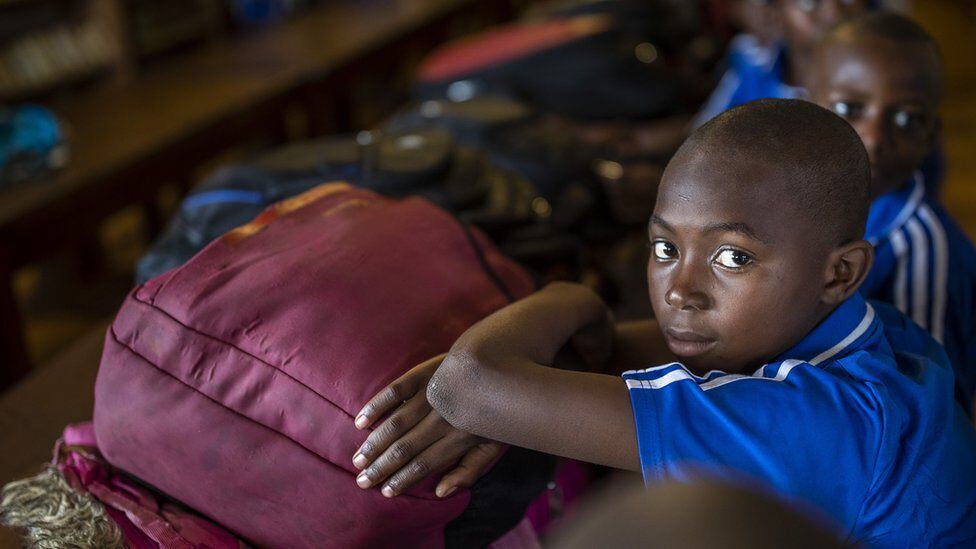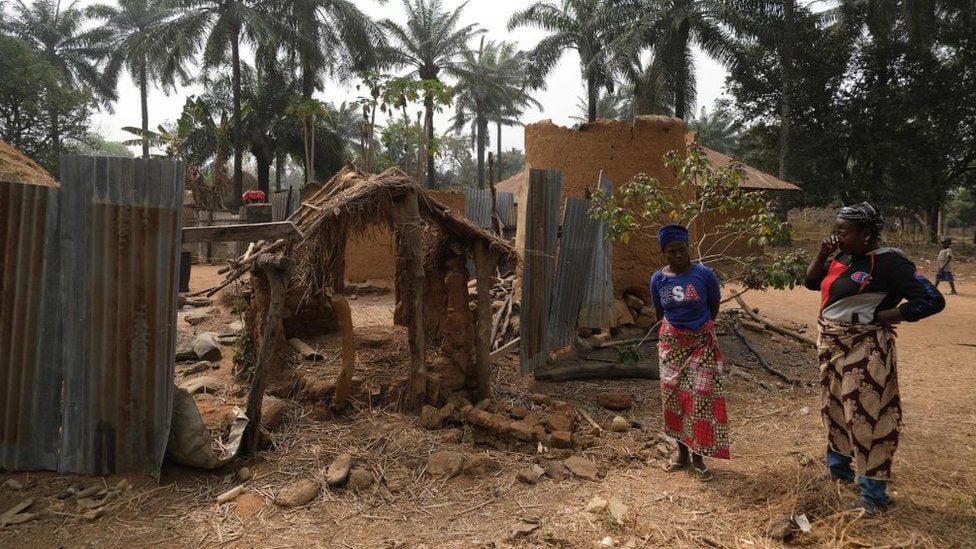:quality(75)/cloudfront-us-east-1.images.arcpublishing.com/elcomercio/GE3TANJNGAYS2MBYKQYDAORRG4.jpg)
After 5 endless years of war, the city of Bamenda, in Cameroonis almost dead.
The standoff between the English-speaking secessionists and the mainly French-speaking government has left only one booming trade: that of coffins.
LOOK: Rhianan Rudd, the teenager whom MI5 accused of terrorism and ended up committing suicide at the age of 16
Bodies are dumped all over the city: in the morgues, on the streets and in the rivers.
City workers pick them up and give them a simple burial.
“Being buried is a blessing,” says a cemetery worker when he comes to Pick up 10 cheap coffins from a funeral home.
Demand for the once popular elaborately designed caskets has waned.
They used to be made in the shape of bibles, cars or beer bottles. to reflect the lifestyle, interests or last wishes of the dead.
“Nobody orders coffins anymore that used to sell for around $1,500 because no one can afford themsays an attendant at a local funeral home.
The usual funerals for young men and boys are a brutal reminder of the conflict in the English-speaking regions of northwestern and southwestern Cameroon.
In just five years, that conflict has claimed tens of thousands of lives, while forcing more than a million to flee to French-speaking areas and another 80,000 to take refuge in neighboring Nigeria.
The war has its roots in grievances dating back to the end of colonialism, when British controlled territory was unified with French areas to create what is now Cameroon.
Many English-speaking Cameroonians have felt marginalized ever since.
And they have opposed what they see as attempts by the government – dominated by the French-speaking majority – to force them to give up their way of life, including their language, history and their education and legal systems.

Tensions erupted in 2016 when tens of thousands of people in Bamenda and other English-speaking areas embarked on a series of protests against the use of French in their schools and courts, as well as the failure to publish government documents in English, even though it is an official language.
Then the government ordered the security forces suppress protests instead of engaging in conversations to resolve grievances.
So the young took up arms the following year to demand the independent status of Ambazonia, as the two English-speaking regions are called.
Now, military vehicles, including those with mounted machine guns, constantly cross the streets of Bamenda.

Residents say soldiers storm homes, make arrests, burn markets and even display the bodies of their victims, including militia commanders, at major intersections. to warn residents not to join separatist fighters.
Government forces have also suffered heavy losses in the conflict.
military morgue
The bodies of fallen soldiers are removed from the military morgue in the capital, Yaoundé, every Thursday and Friday.
Widows weep in front of long rows of coffins draped in the Cameroonian flagbefore the soldiers are buried amid the pomp and ceremony that mark military funerals.

Separatist fighters have also gained notoriety for atrocities committed against civilians.
Including the beheadings and torture of women those they denounce for “betraying the fight”, calling them “black legs”, a term that is now used regularly.
They circulate videos of these atrocities to warn people of the punishment they face if they are suspected of colluding with security forces.
On Mondays, Bamenda becomes a “ghost town”.
The streets dawn empty and the markets closed, as part of a civil economic disobedience campaign dating back to before the armed struggle.

These days, residents who dare to ignore the lockdown order are shot dead or have their shops burned down.
The military and police also disappear from the streets, so that they do not become easy targets for fighters separatists who have a strong presence in the city.
The separatists even ordered the closure of all schools four years ago as part of his campaign. Some have bravely remained open, but the children dare not wear uniforms.
The army imposes a curfew virtually every night in the city, causing many of its restaurants, bars and clubs, once reputed to be the best in Cameroonclose.
The erratic power supply doesn’t help either.

“The endless sound of gunshots It’s scared everyone away,” says a waitress.
He claims that guns have also prevented those living abroad from returning home.
Known as “bushfallers”, they are the people in the diaspora responsible for Bamenda’s economic heartbeat by sending money from abroad.
But the authorities accuse them of finance the Anglophone rebellion.
__________________________________
Cameroon: still divided along colonial lines
_________________________________
The repatriated visitors were arrested and some are now in the Yaoundé or Douala maximum security prisonswhile others simply disappeared.
The bushfallers’ money has dried up and none of them are now visiting the country.
Longtime resident Peter Shang, who once loved city life, says people now live from hand to mouth: “Life is a lottery. There are too many things that remind you of premature death. You talk to someone today and tomorrow they’re gone“.

For Marie Clair Bisu, there is a silver lining: she sees her husband more because he gets home before curfew.
“Now he has discovered his children. This is a man who used to come back late sometimes drunk and just went to bed. She can now play with the children and review her books. This conflict has brought us together,” she says.
“The only problem is that shots always alter our nights“.
And after a night of shootings, residents have to make several calls and listen to traffic to verify that the situation is safe before venturing out.

Even so, shooting has become so common in Bamenda during the day that people no longer immediately run away upon hearing the sound.
“What will we eat if we keep running? I have children to feed,” says a vegetable vendor.
“We just hide for cover and go back to work when the shooting stops.”
Another woman says her daughter has gotten so used to the sound of gunshots that she knows who is shooting.
“My daughter is seven years old and she can tell if the sounds are from army machine guns or ‘The Boys’ AK-47s,” he says, referring to separatist fighters.

Some nuns I meet on a street in the center of the city say they are waiting for a taxi to go to the Abangoh orphanage.
The war has created a explosion in teen pregnancy unwanted, they say.
Many girls have been forced to fleeing their homes becoming victims of sexual violence and exploitation by both sides.
One says angrily: “The rape as a weapon of war It’s despicable.”
In every corner, there is evidence that the very fabric of This once dazzling city where heaps of rubbish now fall, has been permeated by the stench and misery of what many here consider an unnecessary war.
Source: Elcomercio
I am Jack Morton and I work in 24 News Recorder. I mostly cover world news and I have also authored 24 news recorder. I find this work highly interesting and it allows me to keep up with current events happening around the world.






